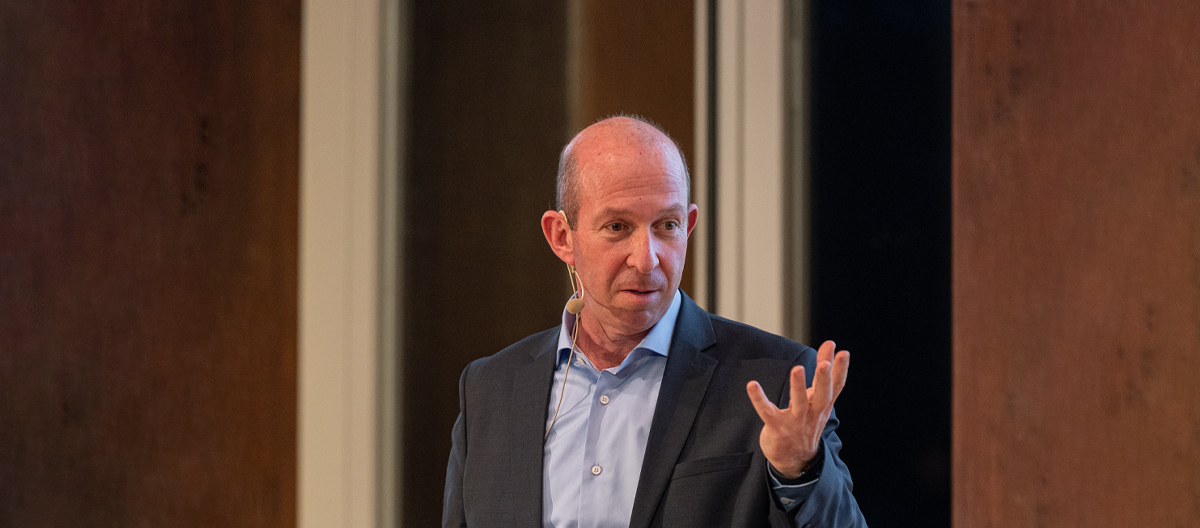
The digital transformation of business education: how Global MBA programs match technological change
28 February 2024The purpose of a top-tier Global MBA is to provide its participants with theoretical concepts and practical knowledge through real case analysis and meetings with leading companies: a real foundation from which to develop a career.
For this reason, it is essential to stay on top of things by keeping abreast of market trends and the technological innovations that influence them.
On Tuesday, Feb. 20, in the classrooms of Villa Guastavillani in Bologna, BBS headquarters, Alon Wolf, founder of the Biorobotics and Biomechanics Lab (BRML) at Technion I.I.TN in Israel, consultant to many global big techs and lecturer in Digital Business and Transformation at Bologna Business School, gave a lecture to the lucky students of the Global MBA track AI and Manufacturing, analyzing the current transformations of robotics and its impact on the world of work.
“We are in transition”, Professor Wolf said: technology, which until recently evolved following two distinct and non-communicating branches – the world of computers and the world of technological infrastructure – is integrating the two paths by developing “smart” electronic devices. The explosive growth of Artificial Intelligence and the speed of data transmission and analysis has linked machines together: today robotic devices have become part of everyday life, in our homes equipped with home automation, and in cars that are increasingly technological (and now close to autonomous driving systems). “What were once just machines today are robots: they are intelligent, they act.”
Then there is the network growth, up to the constitution of the metaverse. Despite all its implications, this is still basically a world apart: we cannot feel with our bodies what is happening in the metaverse, we cannot smell, or touch the virtual world. This involves only eyes and ears. Shortly probably, thanks to superconductors able to connect chemical receptors and translate sensations into data, the integration of real and virtual worlds will be almost absolute, already devices like Google Glass give us a taste of this, but for now this is not the technology at the center of the market.
What is revolutionizing the planet and, therefore, markets is robotics. Robots are now connected to the cloud, capable of exchanging information and learning: self-awareness is the frontier on which the vanguard of the marriage of devices and AI is working. Machine learning, deep learning, and connected machines capable of learning from themselves, and from their surroundings are the future that we can already see in the projects of companies such as Boston Dynamics, producers of robots with qualities that were unthinkable until yesterday. These are CoBots: robots that work together and complement humans, or replace their tasks.
The first use of these devices was in nuclear power plants: robotic arms to move radioactive metals could perform jobs impossible for humans and their physical health. These robots are so advanced that they can shake a human hand in greeting, hold an egg between their fingers without breaking it, run on slippery ground, climb and descend stairs, swim and fly. The Atlas robot, a humanoid biped introduced in 2013, can now perform a parkour course by vaulting, jumping and balancing. BigDog, also from Boston Dynamics, first unveiled in 2005, can climb and descend stairs, reacting to a sudden kick without falling or losing its balance.
Robots know how to produce materials such as concrete, print laminates. They are now technically able to build a house by designing it, producing the parts and assembling them. “This level of evolution,” Professor Wolf tells us, “is the revolution.”
The effects on people’s lives are many and will be increasingly pervasive: robots will cooperate with or replace humans in heavy, repetitive work, just as has happened with agriculture over the past two centuries. But, this change will be much more rapid: we need to study adaptive strategies. The integration of robots into business is the future and is inevitable. Humans must rethink the work activities that will survive the robotization of some industries, just as was done with the mechanization of heavy industry.
The answer can be found in higher education, in cutting-edge curricula. Bologna Business School, born from the oldest university in the world, is based in Bologna, with its highly specialized manufacturing hub in automation and home to the CNR Technopole of Bologna, which is part of the 10 Technopoles of Emilia-Romagna and promotes innovation in both established and emerging industrial systems. Thanks to this meeting of tradition and the future, it is unique in offering a mix of knowledge that is indispensable today for understanding market dynamics and knowing how to master them.
In this context, Bologna Business School‘s full-time 12-month Global MBA, with its five tracks AI and Manufacturing – Design, Fashion and Luxury Goods – Food and Wine – Green Energy and Sustainable Businesses – Supercars, Superbikes and Motorsports, is the ideal path to gain technical and management skills to join cutting-edge companies.
Robots are our future. A thousand years of academic history behind them, connected with the top global companies, are the best starting point to become leaders of the technological change that is revolutionizing our world.
